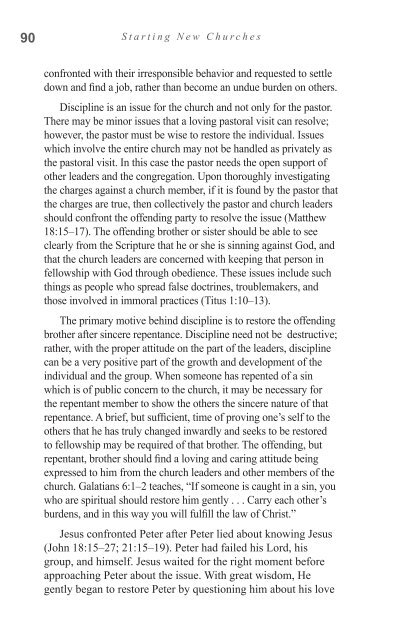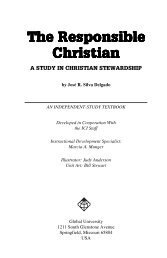You also want an ePaper? Increase the reach of your titles
YUMPU automatically turns print PDFs into web optimized ePapers that Google loves.
90 S t a r t i n g N e w C h u r c h e s<br />
confronted with their irresponsible behavior and requested to settle<br />
down and find a job, rather than become an undue burden on others.<br />
Discipline is an issue for the church and not only for the pastor.<br />
There may be minor issues that a loving pastoral visit can resolve;<br />
however, the pastor must be wise to restore the individual. Issues<br />
which involve the entire church may not be handled as privately as<br />
the pastoral visit. In this case the pastor needs the open support of<br />
other leaders and the congregation. Upon thoroughly investigating<br />
the charges against a church member, if it is found by the pastor that<br />
the charges are true, then collectively the pastor and church leaders<br />
should confront the offending party to resolve the issue (Matthew<br />
18:15–17). The offending brother or sister should be able to see<br />
clearly from the Scripture that he or she is sinning against God, and<br />
that the church leaders are concerned with keeping that person in<br />
fellowship with God through obedience. These issues include such<br />
things as people who spread false doctrines, troublemakers, and<br />
those involved in immoral practices (Titus 1:10–13).<br />
The primary motive behind discipline is to restore the offending<br />
brother after sincere repentance. Discipline need not be destructive;<br />
rather, with the proper attitude on the part of the leaders, discipline<br />
can be a very positive part of the growth and development of the<br />
individual and the group. When someone has repented of a sin<br />
which is of public concern to the church, it may be necessary for<br />
the repentant member to show the others the sincere nature of that<br />
repentance. A brief, but sufficient, time of proving one’s self to the<br />
others that he has truly changed inwardly and seeks to be restored<br />
to fellowship may be required of that brother. The offending, but<br />
repentant, brother should find a loving and caring attitude being<br />
expressed to him from the church leaders and other members of the<br />
church. Galatians 6:1–2 teaches, “If someone is caught in a sin, you<br />
who are spiritual should restore him gently . . . Carry each other’s<br />
burdens, and in this way you will fulfill the law of Christ.”<br />
Jesus confronted Peter after Peter lied about knowing Jesus<br />
(John 18:15–27; 21:15–19). Peter had failed his Lord, his<br />
group, and himself. Jesus waited for the right moment before<br />
approaching Peter about the issue. With great wisdom, He<br />
gently began to restore Peter by questioning him about his love
















